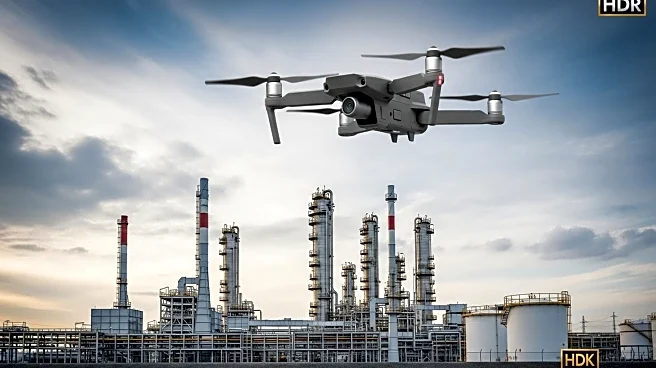What is the story about?
What's Happening?
Recent reports have emerged suggesting that Ukrainian drone attacks have significantly impacted Russia's oil refining capacity, with claims that up to 38% of this capacity has been knocked out. The attacks targeted 16 refineries, which collectively account for 123 million tons of oil refining capacity annually, representing 38% of Russia's total capacity. However, the actual extent of the damage remains complex and debated, with the figure representing an upper limit of potential damage rather than confirmed losses. The situation highlights the ongoing strategic use of drones by Ukraine in its conflict with Russia, aiming to disrupt critical infrastructure.
Why It's Important?
The potential reduction in Russia's oil refining capacity could have significant implications for the global energy market, affecting oil prices and supply chains. If the reported damage is accurate, it could strain Russia's ability to meet domestic and international energy demands, potentially leading to increased energy costs and shortages. This development underscores the strategic importance of energy infrastructure in modern conflicts and the role of technology, such as drones, in warfare. The situation may also influence geopolitical dynamics, as countries dependent on Russian energy may seek alternative sources.
What's Next?
Further assessments and confirmations of the actual damage to Russia's oil refining capacity are expected. The international community, including energy analysts and geopolitical experts, will likely monitor the situation closely to understand its broader implications. Russia may respond by increasing security measures around its energy infrastructure or retaliating against Ukrainian targets. Additionally, discussions within NATO and other international bodies may focus on supporting Ukraine's defense capabilities and addressing the energy security challenges posed by the conflict.
Beyond the Headlines
The use of drones in warfare raises ethical and legal questions about the conduct of hostilities and the protection of civilian infrastructure. As technology continues to evolve, the international community may need to revisit existing frameworks governing the use of such technologies in conflict. The situation also highlights the vulnerability of critical infrastructure to modern warfare tactics, prompting countries to reassess their security measures and resilience strategies.

















